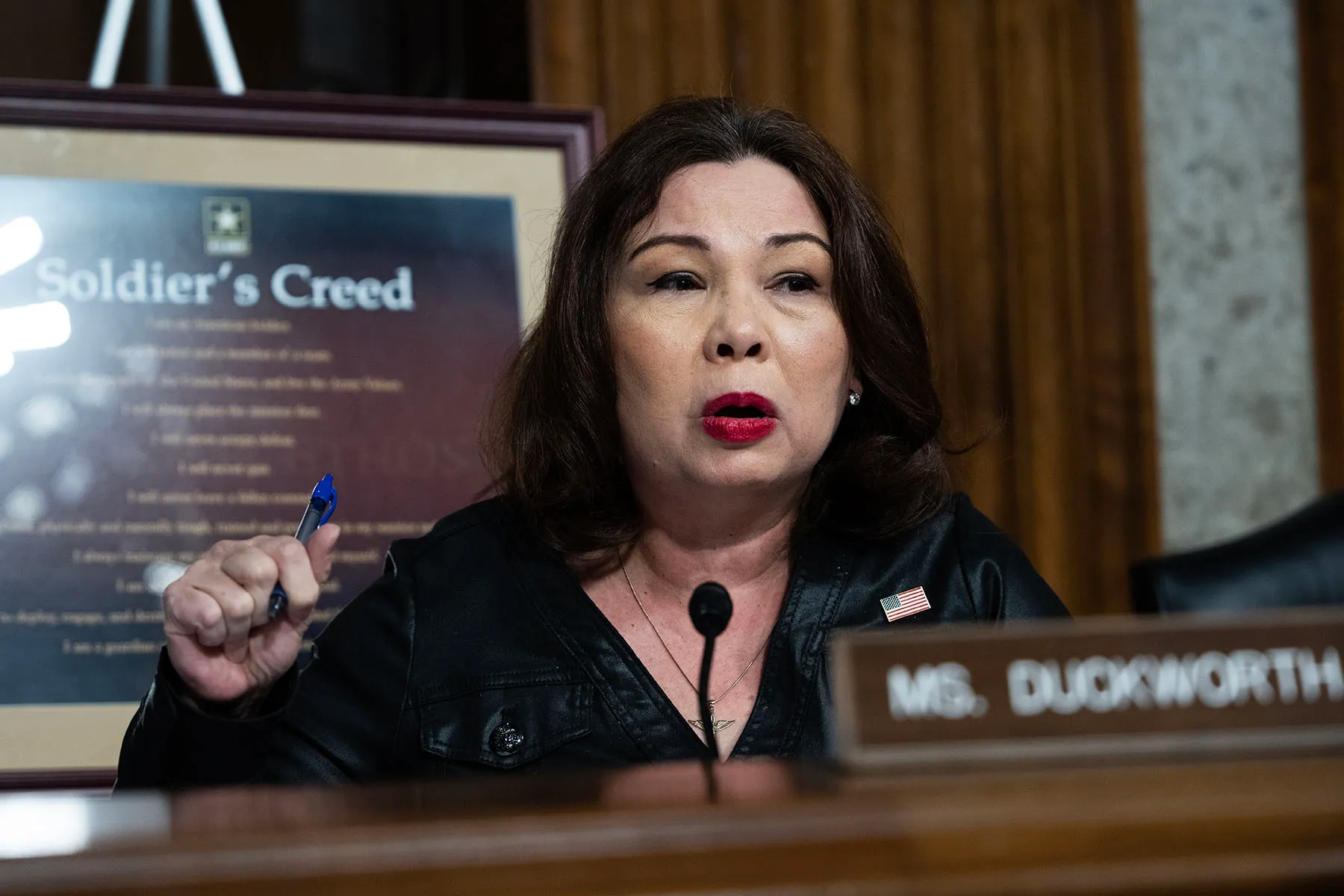Pete Hegseth, President-elect Donald Trump’s nominee for secretary of defense, appeared before the Senate Armed Services Committee this week for a high-stakes and at many times contentious confirmation hearing.
Many Democrats focused on Hegseth’s personal controversies and past allegations of misconduct, which he vigorously denied, or his past comments opposing women serving in combat, which he backtracked on.
But some of the most striking and revealing exchanges were with Democratic Sen. Tammy Duckworth of Illinois, an Iraq War veteran who served in combat as a helicopter pilot. When asked by Duckworth to name one of the agreements the secretary of defense personally negotiates, he couldn’t name one. He also couldn’t name a country in ASEAN, an intergovernmental association of 10 Southeast Asian countries that includes key U.S. military allies.
“He also talked at length about not lowering the standards for anybody else. And yet, as far as I could tell, that hearing was all about him asking us to lower the standards for him,” Duckworth said in an interview with The 19th.
Many criticisms of Hegseth have surrounded a confidential settlement he paid to a woman who accused him of raping her in 2017 and past accusations of mismanagement of a veterans’ nonprofit. At the hearing, Hegseth said he was falsely accused of assault in an encounter he said was consensual and dismissed other allegations as “anonymous smears.”
After the hearing, Republican Sen. Joni Ernst of Iowa, who has worked to combat sexual assault in the military and a closely watched vote on Hegseth, came out for his confirmation. Republicans control the Senate, and the Armed Services Committee plans to vote Monday on Hegseth’s confirmation, setting him up to become defense secretary as soon as the middle of next week.
Duckworth said she went into the hearing perhaps most concerned about Hegseth’s qualifications and knowledge base. She said in a floor speech Thursday that she doesn’t oppose his nomination on partisan grounds: she supported past Trump picks to lead the Pentagon, including Gen. James Mattis and Mark Esper, because she believed they were qualified.
Hegseth lacks the traditional management experience of past Defense Department leaders, a job that entails overseeing a roughly $850 billion budget and 3.4 million personnel. Hegseth, who served in the U.S. Army National Guard, has most recently been a co-host on “Fox & Friends” weekends. At Tuesday’s hearing, Hegseth pitched himself as an outsider and a force for much-needed change, ready to shake things up. In his opening statement, Hegseth said that he would “bring the warrior culture” back to the Pentagon and would make up for his lack of experience by hiring “people smarter and more capable than me” to work under him.
“As this is going along, I’m thinking, ‘Why don’t we just hire some guy who’s smarter than you to do the job at all? If you’re going to have to hire all these other people smarter than you to help you do the job, let’s just cut the middle man,” Duckworth said.
Duckworth asked Hegseth about things the secretary of defense can’t delegate to someone else and has to personally negotiate and sign off on: status of forces agreements, acquisition and cross-serving agreements, and defense trade cooperation treaties. She’s traditionally led the congressional delegation to the Shangri-La Dialogue, an annual Asia-Pacific defense summit, and seen other secretaries negotiate in real time.
“I’ve watched Mattis, and I’ve watched [current Secretary of Defense Lloyd] Austin, and I’ve watched Esper go toe-to-toe with the Chinese defense secretary at these international forums,” she said. “And I was like, ‘This man can’t go toe-to-toe with the communist Chinese defense secretary, he’ll be eaten alive.’”
Duckworth asked Hegseth about the highest level of international security negotiation he’d been involved in, and he responded that he hadn’t been in government since his military service. She then asked him to name one of the three main types of such agreements.
“If you’re talking about defense arrangements, NATO might be one,” he said.
“Status of forces agreement would be one of them,” she said.
“I’ve been a part of teaching about status of forces agreements in Afghanistan,” he said.
“But you don’t think to mention it?” she replied. “You’re not qualified, Mr. Hegseth.”
“This is basic, 101 stuff for someone who wants to be secretary of defense, and he couldn’t answer any of them,” Duckworth said later. “So that’s how I got to my line of questioning. It wasn’t actually anything that I was planning ahead of time. It was just really being prompted by his answers and his statements.”
Her question on ASEAN also came from Hegseth’s own statements in the hearing. He referenced the 2018 National Defense Strategy, which emphasizes the importance of ASEAN to Trump’s first-term strategy for the Indo-Pacific region, a key sphere of influence for the United States in countering China and a subject Duckworth had hoped to discuss in her allotted seven minutes of questioning.
So she asked Hegseth to “name the importance of at least the nations in ASEAN and what type of agreement the U.S. has with them” and how many nations are in ASEAN.
“I couldn’t tell you the exact number,” Hegseth said, instead listing other key U.S. military allies like South Korea and Japan and the AUKUS agreement the United States has with the United Kingdom and Australia.
“Mr. Hegseth, none of those three countries that you mentioned are in ASEAN,” she said. “I suggest you do a little bit of homework before you prepare for these types of negotiations.”
Clips of Duckworth’s exchanges with Hegseth gained traction online following the hearing. Her questions weren’t meant to create a viral or a “gotcha,” moment, she said, but to press Hegseth on basic but crucial aspects of the job.
“I think that’s why it resonated because it became very clear that this man is not qualified to do the job,” she said. “And it became very, very clear around the world that this man is not qualified to do the job. When you can’t name a major treaty ally, like the Philippines, where we’ve had base agreements on and off; when you can’t name Thailand, our oldest treaty ally of 190 years; when you can’t name Singapore where we have an air base, are you kidding me?”
Her questioning received plaudits across the board. Alyssa Farah Griffin, a former Trump White House official turned Trump critic and current co-host of ABC’s “The View,” said she believed Duckworth had the best approach out of all the Democrats on the panel.
“I thought that Tammy Duckworth was the most effective because she challenged him on the facts and duties of the job, and he came up short,” Griffin said on the show Wednesday. “I have been to the ASEAN summit, I can name the countries that are in it, and I am woefully unqualified to be the secretary of defense.”
In her floor speech on Thursday and in the hearing, Duckworth spoke in front of a copy of the Soldier’s Creed, which she said hangs over her desk in the Senate and hung over her desk at Walter Reed Medical Center when she was treated for injuries she sustained in combat, including the loss of both of her legs and some mobility in her right arm after Iraqi insurgents hit her Black Hawk helicopter with a grenade in 2004.
“Part of being a leader is knowing when you’re not competent enough to do the job,” she said on the floor. “Well, Mr. Hegseth, you are not technically proficient. You are not tactically proficient. And your nomination is an insult to those brave enough to be serving our nation. So you, sir, are a no-go at this station.”







